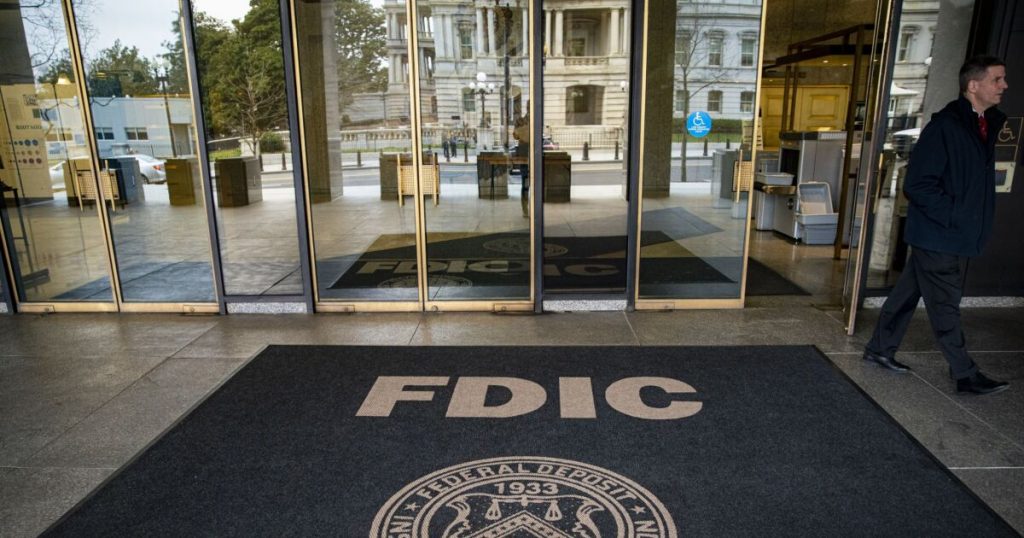Enjoy complimentary access to top ideas and insights — selected by our editors.
The Federal Deposit Insurance Corp., like many government entities, is going through a rough period of change under the new Trump administration. Experts predict that staff cuts, a problematic work culture and regulatory changes are just the start of what’s to come.
Last month, acting FDIC Chair Travis Hill sent a letter to House Financial Services Committee member Dan Meuser, R-Pa., explaining how the agency would be working with the Treasury to
Hill joins other changemakers working to address the trend of “
The FDIC also pivoted on another contested policy in the banking space in March, removing a previously necessary approval for
Daniel W. Hartman, of counsel with Boston-based law firm Nutter and former counsel at the Federal Reserve Bank of Boston, said changes in both crypto and reputational-risk policies are “a clear indication” that the FDIC is keen to grant banks more freedom.
“The FDIC is going to basically allow banks to pursue the transactions and activities that are best for them, as long as they are consistent with safety and soundness, consumer protection and anti-money-laundering laws,” Hartman said.
Crypto advocates like Lamine Brahimi, cofounder of the Swiss digital asset infrastructure provider Taurus SA, agreed with the sentiment that the rollback of Biden-era policies at the agency is good for the crypto industry so long as the policies that protect consumers and innovations alike are kept in place.
Read more:
Not all changes have been upbeat.
President Donald Trump’s efforts to quell government spending saw the FDIC dismiss about 10% of its overall staff in February.
Data from the FDIC’s Office of Inspector General published last month identified numerous problem areas in the agency that hamstring its regulatory duties, caused in large part by workplace culture issues and the layoffs. Since the firings are ongoing, the OIG couldn’t speculate what the true impact is.
These cuts magnify a series of problems that existed at the FDIC prior to Trump’s reelection, chief of which has been the shortage of qualified bank examiners that was cited as a key factor in the 2023 failure of Signature Bank. Hill
Jared Tully, vice chair of Frost Brown Todd’s Business Litigation Practice group and team leader for its Community Bank and Financial Institutions team, said while the FDIC will eventually adapt its smaller headcount for bank examinations, innovation takes time.
“In the short term, I do expect that examination capabilities will be hampered [and] in the midterm, I envision adaptation,” Tully said. “Long term, I believe that the FDIC will innovate in ways that allow it to meet its examination oversight to protect depositors and the industry.”
Read more:
Industry advocates are on standby for further changes at the FDIC.
“A lot of work went into the regulations following the 2008 financial crisis,” said Naeem Siddiqi, senior risk advisor for business analytics software firm SAS. “No one wants to see a repeat of the mistakes that led to that crisis and the ensuing Great Recession.”
Catch up on the latest changes at the FDIC below.

FDIC plagued by attrition, persistent office issues
New findings from the FDIC’s Office of the Inspector General show that the continual outflow of staffers and unresolved workplace problems are significantly affecting the agency’s regulatory performance.
The
“As a result of staff attrition, the FDIC will need to ensure that it has sufficient staff with the necessary skills and qualifications to complete statutorily required examinations and should assess the impact of attrition on the FDIC’s capacity to execute resolutions and receiverships effectively,” the OIG said in its report. “We also previously identified, and continue to find, that the FDIC has not established an accountable workplace culture, including an adequate sexual harassment prevention program.”
Read more:

Mass layoffs at FDIC, CFPB put on hold
Amid widespread layoffs at the FDIC, the Consumer Financial Protection Bureau and other government agencies, Judge James K. Bredar of the U.S. District Court for the District of Maryland has put a temporary stop to the firings.
Bredar concluded that because the layoffs failed to provide states with advance notice, which is legally required, state administration was ill-prepared to handle the influx of unemployment and social service requests.
“Because the federal government’s recent discharge of thousands of probationary employees was not executed in compliance with rules intended to ensure that states are ready to bear the load cast upon them when mass layoffs occur, and because the plaintiff states are not yet in fact so prepared, and because of the violations, the recent directives of various federal agencies terminating probationary employees must be stayed,” the judge stated in his explanation.
Read more:

The deregulation of the FDIC invites industry volatility, experts say
Banking executives have by and large embraced the Trump administration’s deregulatory attitude toward the FDIC, but industry experts say the changes could have yet-to-be-realized consequences for the long term.
FDIC officials debuted a proposal to rollback the agency’s
“The measures underscore how quickly and dramatically rules can change with a new administration, and how oversight has become increasingly polarized and partisan,” Ian Katz, managing director at Capital Alpha Partners, told American Banker. “Though the financial services industry generally favors most of the moves Trump appointees are making, the regulatory whiplash that can occur after presidential elections complicates long-term business planning.”
Read more:

FDIC lays off 10% of overall headcount
Following directives from the Office of Personnel Management, the FDIC laid off roughly 600 to 700 employees at the end of February.
The firings were a joint result of probationary employees being let go as well as departures from staff members who opted to take the deferred resignation offers and leave voluntarily.
The efforts have drawn sharp opposition from the National Treasury Employees Union, which represents employees across 37 departments and offices including the FDIC, as well as the American Federation of Government Employees — which
Read more:

FDIC walks back support for Colo. interest rate exportation lending law
FDIC officials have withdrawn a 2024 amicus brief supporting a Colorado state law on capping interest rates on loans to residents from out-of-state lenders, pending a new lawsuit.
In National Association of Industrial Bankers, et al v. Weiser, et al, nonbank lending advocates are challenging the legality of the Colorado statute by arguing the provisions are unclear as to which interest rate caps apply in situations where borrowers and lenders are in different states.
“Today’s decision to withdraw the amicus finally restores longstanding guidelines and returns pragmatic, non-ideological policymaking to the FDIC,” Phil Goldfeder, chief executive of the American Fintech Council, said in a statement supporting the FDIC’s decision.
Read more:

